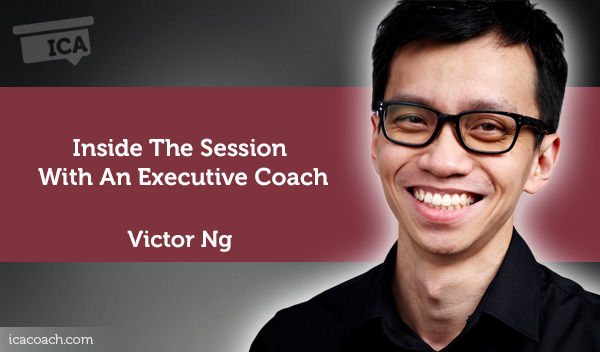Coaching Case Study By Victor Ng
(Executive Coach, SINGAPORE)
Introduction
This case study reviews the coaching of one of my clients who was facing adversity at the workplace. It includes the coaching process, my specific questions, key coaching skills, and results of the coaching. This is an example of how executive coaching can help clients be more productive, engaged and motivated.
The Client
Bernard is a C-suite executive of the country’s largest financial company. He has worked at the company for 12 years and prides himself on a solid track record based on consistent excellence. A family man with three young children, Bernard came across as someone who takes his dual responsibility as a professional and provider seriously.
The Coaching Topic
With a recent change in leadership, Bernard found himself demotivated and unengaged at work. He wanted me to help him change that and find a way to enjoy his job again.
The Challenge
Bernard believed that his new boss was biased against him, leaving him to speculate his future with the company. He also described his workplace culture as one that was heavily political, which led him to constantly look over his shoulder.
It didn’t help that a couple of his peers had left the company for not seeing eye-to-eye with his new boss. As a self-professed straight-shooter, Bernard isn’t afraid to speak his mind if he believes he’s right.
Bernard talked about his daily emotions going to work; he felt frustrated about his predicament. He was unmotivated to follow through his projects, as he was sure his boss would discredit him no matter how well he performed. He was afraid of losing his job and compromising the financial stability of his family.
The Key Questions
What do these emotions say about your mindset for work?
When you say “survival mindset”, what are you really trying to survive from?
What is most important about your job?
What is important to your boss?
They say as humans, we unconsciously make snap judgments about others, to decide if someone is a friend or foe. What are you doing to make your boss not think of you as a foe? From what you described about your boss, what underlying belief or rule is behind your feelings toward your boss?
How does win-win look like?
What can you do now so your boss will know you’re all about building win-win relationships?
As someone who enjoys challenges, how would you approach this challenge of managing change?
Regardless of how this turns out, what values do you hold yourself to through good or bad times?
The Shift
Bernard started by exploring his own emotions and mindset. His self-awareness grew and he realized that he was “just trying to survive” the leadership change.
While he did not necessarily agree with his superior’s way of working, he could understand the objectives behind the actions. He surprised himself with how little he thought of the things that were important to his boss.
As the coaching progressed, Leonard began to see how could have unwittingly presented himself as a threat to his boss.
He clarified that was never his intention. He saw the conflict in his situation: He wanted things to stay the same like they were for the past 12 years, but his new boss was already putting change in place. The result was a direct collision course between him and his boss.
The shift in perspective happened when Bernard saw how he could keep his job and enjoy it — IF he could show his manager he can work in a way that benefits both of them.
An affirmation of his work ethics — integrity, professionalism, reliability — gave him the motivation to represent himself regardless of the outcome.
The Skills & Tools
As with every coaching engagement, a multitude of coaching skills and tools are used. Here are the more noteworthy ones I used with Bernard.
Acknowledgement :
Any highly accomplished individual will feel vulnerable at times. It was important to acknowledge the person for their strengths and their identity. Bernard needed to know he was still a top-tier executive, something he was no longer sure of at the start of coaching. It was also important to acknowledge his desire to adapt and will to survive the adversity.
Active Listening:
Corporate executives, especially senior ones, have a conditioned veneer to their communication. Being able to listen intently to the person — not the professional — speaking was critical to the coaching. Listening to the emotion, energy, and intent of the client allowed me to ask questions targeted at the person that Bernard is.
Responding vs Reacting:
Bernard’s frustration at the beginning of the coaching soon turned into calmness. This was an essential step to getting the client into a space where he could rationally decide an appropriate response to his situation. By removing emotion as the driver of his thoughts and actions, we successfully achieved a shift in his perspective and put an action plan in place.
Challenging Underlying Beliefs:
As the coaching continued, Bernard admitted he had a self-limiting belief: “Change is bad”. He saw himself as a stereotypical middle-aged senior manager in a stable job with a family to provide for – not someone who was nimble enough to turn the sails to meet the changing winds.
We worked to challenge his long-standing aversion to change. With his permission, I invited him to question the validity and application in his belief. His positive response led to a deep transformation within that allowed him to make the necessary changes.
The Result
We worked out an action plan to snap out of “survival mode”; it required him to be active with, rather than to avoid, his superior.
- He changed his way of working; aligning his efforts to make his manager’s priorities his priorities
- He gave a talk to the management team about the importance of building win-win internal relationships, positioning himself as an advocate for collaboration
- He de-escalated himself as a threat to his manager with regular consulting before making any decision
- He refocused on his role and initiated new proposals to his manager
- He followed through with his previously dormant projects with renewed vigor — aligning them to meet his manager’s objectives and keeping him in the loop
The results? Bernard is not only surviving the change around him, he’s thriving in it. The projects he co-led with his manager yielded millions of dollars in incremental revenue for the company. He has earned the trust of not just his manager, but the entire management team for his performance and adaptability.
Most importantly, he feels energized and engaged going to work every day.


